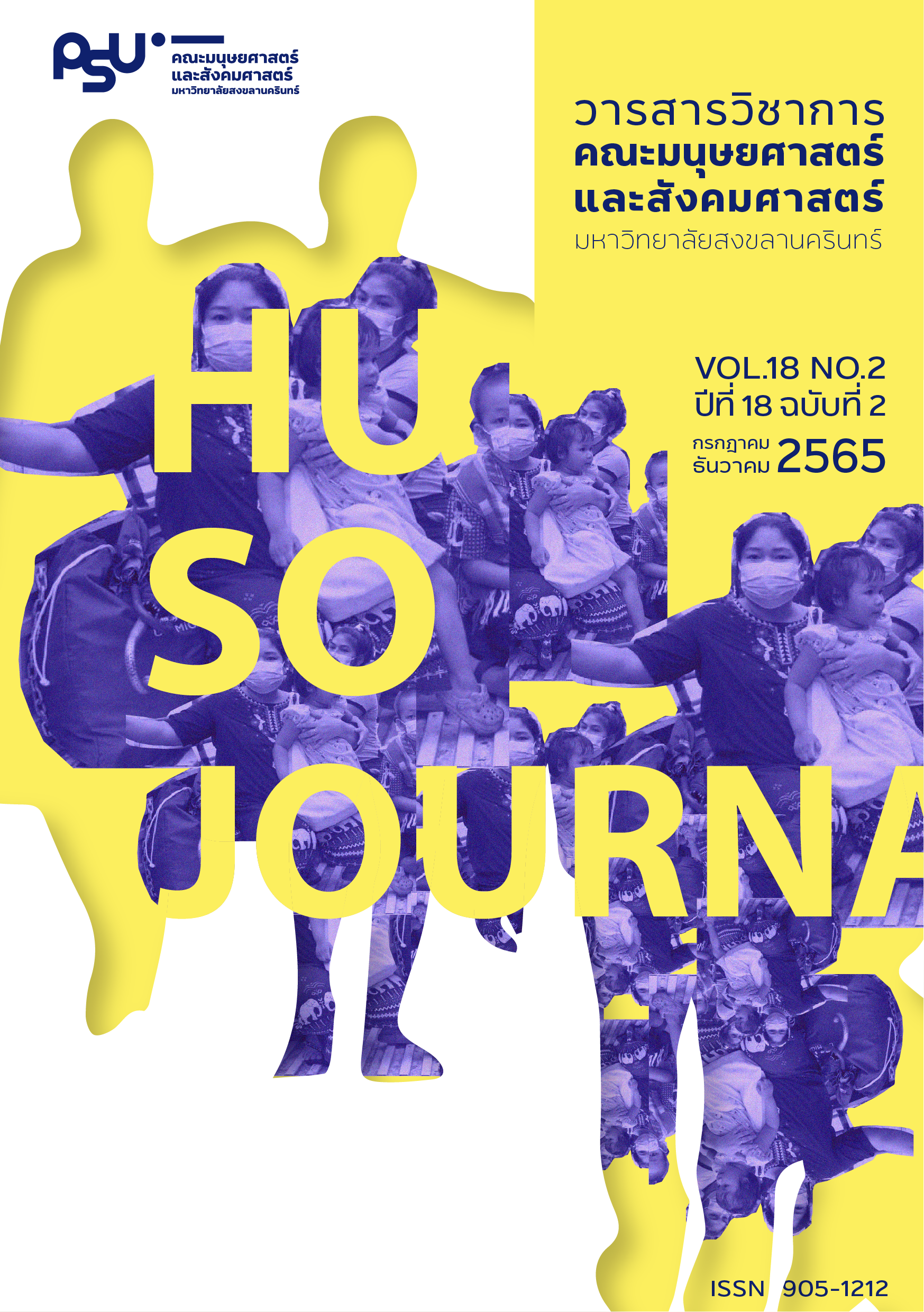A comparative study of patani malay and thai kinship terms
Keywords:
kinship term, componential analysis, generation, linearity, age, gender, parental sideAbstract
This paper is a comparative study of kinship terms in Patani Malay and Thai. The purpose of this study is to compare kinship terms in Patani Malay and Thai by using componential analysis. It also aims to point out certain significant characteristics in three southern border provinces and Thai culture as reflected in the meanings and use of kinship terms. The data used in this study was gathered by interviewing native speakers of Patani Malay living in Mueang Pattani District and Thai native speakers.
The results of the study revealed that the basic kinship terms both Patani Malay and Thai contain four of the same dimensions of contrast: 1) generation 2) linearity 3) age and 4) gender. The only different dimension of contrast is the parental side, which is only in the basic kinship terms in the Thai language.
The basic kinship system in social and cultural aspects reflects a significant characteristic of “seniority” from the dimension of generation and age, especially in the context of Thai society and culture where the senior system has been operating for a long time. For parental side found that Patani Malay and Thai are different. The kinship terms in Thai reflect a significant characteristic of the parental side. But the kinship terms in Patani Malay are not a significant characteristic of the parental side.
References
กองประสานราชการ กรมมหาดไทย. (2506). สภาพสังคมสี่จังหวัดภาคใต้. พระนคร: โรงพิมพ์ส่วนท้องถิ่น.
ขจัดภัย บุรุษพัฒน์. (2519). ไทยมุสลิม. กรุงเทพฯ: โรงพิมพ์แพร่พิทยา.
จรัสวิไล จรูญโรจน์, หม่อมหลวง. (2543). วัฒนธรรมที่แสดงให้เห็นโดยคำเรียกญาติภาษาฮินดี. วารสารอินเดียศึกษา. กรุงเทพฯ: ศูนย์อินเดียศึกษามหาวิทยาลัยธรรมศาสตร์, 5(1), 231-251.
จำปาทอง โพธิ์จันธิราช. (2553). การวิเคราะห์อรรถลักษณ์เชิงเปรียบเทียบคำเรียกญาติในภาษาลาว กึมหมุ และมลายู, ภาษาและวัฒนธรรม, 29 (1), 57-72.
ประสาน ศรีเจริญ. (2540). วางแผนครอบครัวในอิสลาม. กรุงเทพฯ: พญาไทการพิมพ์.
วินัย ครุวรรณวัฒน์. (2522). ทัศนคติของคนไทยในสี่จังหวัดภาคใต้ที่มีต่อประเทศสหพันธ์มาเลเซีย.วิทยานิพนธ์ปริญญามหาบัณฑิต จุฬาลงกรณ์มหาวิทยาลัย.
วิภัสรินทร์ ประพันธศิริ. (2535). คำเรียกญาติในภาษาคำเมือง. วิทยานิพนธ์ปริญญามหาบัณฑิต จุฬาลงกรณ์มหาวิทยาลัย.
ศุภมาศ เอ่งฉ้วน. (2537). คำเรียกญาติภาษาจีนฮกเกี้ยนในภาคใต้ของประเทศไทยสมัยสุโขทัยและสมัยปัจจุบัน. วิทยานิพนธ์ปริญญามหาบัณฑิต จุฬาลงกรณ์มหาวิทยาลัย.
อมรา ประสิทธิ์รัฐสินธุ์. (2533). ลักษณะสำคัญบางประการในวัฒนธรรมไทยที่แสดงโดยคำเรียกญาติ. ภาษาและวรรณคดีไทย,7 (1), 55-68.
อารง สุทธาศาสน์. (2543). สถาบันครอบครัวอิสลาม: วิเคราะห์เชิงเปรียบเทียบ, รวมบทความสังคมวิทยาและมานุษยวิทยา. กรุงเทพ : โรงพิมพ์แห่งจุฬาลงกรณ์มหาวิทยาลัย.
Eastman, Carol M. (1978). Aspects of language and Culture. Washington: University of Washington Chandler and Sharp publisher.
Frake, Charles O. (1980). Language and Cultural Description. Stanford: Stanford University Press.
Prasithrathsint, Amara. 1996. A Comparative Study of the Thai and Zhuang Kinship System. Collection of Papers on the Relationship between the Zhuang and the Thai. Bangkok: Chulalongkorn University.
Sturtevant, Willam C. (1964). Studies in Ethnoscience. American Anthropologist, 66, 3 (2), 99-131.
Whorf, Benjamin Lee. (1956). A linguistics Consideration of Thinking in Primitive Communities. Language thought and community. Cambridge: Technology Press of Massachusetts Institute of Technology.
Downloads
Published
How to Cite
Issue
Section
License
Copyright (c) 2022 Journal of Humanities and Social Sciences Prince of Songkla University

This work is licensed under a Creative Commons Attribution-NonCommercial-NoDerivatives 4.0 International License.
บทความนี้ได้รับการตีพิมพ์เป็นของวารสารวิชาการคณะมนุษยศาสตร์และสังคมศาสตร์ คณะมนุษยศาสตร์และสังคมศาสตร์ มหาวิทยาลัยสงขลานครินทร์ วิทยาเขตปัตตานี






